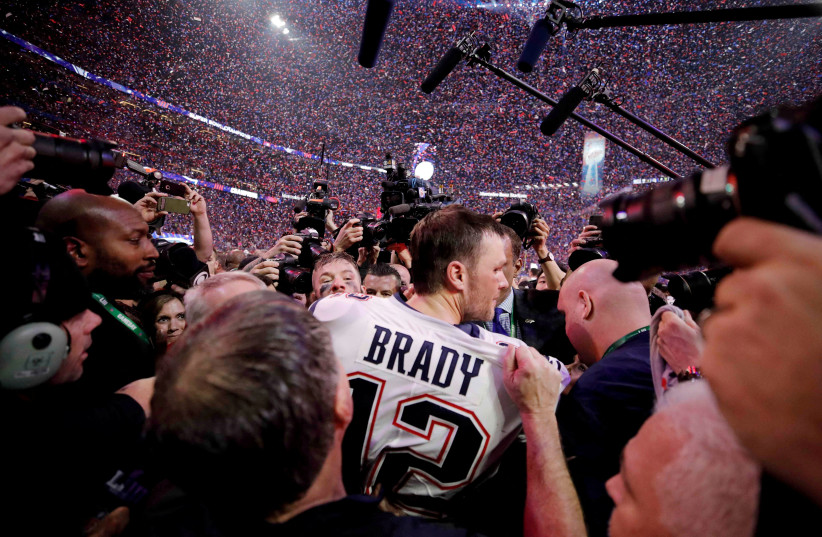Is Benjamin Netanyahu the Tom Brady of Israel? - analysis

If the first five weeks of this new government are any indication, Benjamin Netanyahu is on a similar trajectory to NFL great Tom Brady.
Prime Minister Benjamin Netanyahu demonstrated in his Tuesday interview with CNN’s Jake Tapper that he knows a thing or two about American football.
At the start of the interview, Netanyahu made a point of congratulating Tapper – who is from Philadelphia and a long-time fan of the Philadelphia Eagles football team – on the Eagles making it to next week’s Super Bowl.
“I don’t want to intervene in your football politics,” Netanyahu said, “but I understand the Eagles made it to the Super Bowl. I offer you my personal congratulations.”
The history of Tom Brady, the NFL great
If Netanyahu is up to date on the NFL playoff picture, then he undoubtedly knows of Tom Brady and his recent retirement.
Tom Brady is arguably the greatest football player ever to play the game. He retired last week from the Tampa Bay Buccaneers, at the age of 45, after having played 23 seasons in the NFL.

This was not the first time Brady retired, however. At the end of the season last year, In February 2022, he also retired, after losing in the NFC divisional playoff round.
When he retired in 2022 the tributes poured in, with everyone speaking of the end of an era.
Then, however, he changed his mind and returned for another year. But things had changed.
Even at 45 he still had the skills that would make younger quarterbacks jealous. But, as CNN wrote on its website on Sunday, “It was Brady’s surroundings which began to fall apart instead. Between an injury-plagued offensive line, his offensive weapons injured or out of sync and the defense struggling, the Bucs could never maintain a winning run.
“And so, what was meant to be a final swansong and a blaze of glory to an eighth Super Bowl title spluttered to an 8-9 regular season record… before being roundly thumped in the first round of the playoffs by the Dallas Cowboys.”
The country singer Kenny Rogers once memorably sang: “You’ve got to know when to hold ‘em/ Know when to fold ‘em/ Know when to walk away/ And know when to run.”
Like so many in so many fields, Brady didn’t know when to fold ’em; he didn’t know when to walk away. So he went out not with the bang he deserved, but with a dud. He still had the skills, but his supporting cast – including his supermodel wife Gisele Bündchen from whom he divorced in October – was not the same, and he could not get done what he was accustomed to getting done in the past.
Is Benjamin Netanyahu on a Tom Brady trajectory?
If the first five weeks of this new government are any indication, Netanyahu is on a similar trajectory. He, like Brady, has been at his job for a long time. He, like Brady, has exceptional skills. He, like Brady, came back for another shot. And he, like Brady, is playing with a different supporting cast that makes victory anything but certain.
When historians look back on Netanyahu’s tenure as prime minister from 2009 to 2021, two elements will stick out: Israel’s jaw-dropping economic success, and it’s vastly improved standing on the international stage.
Both those elements, the economy and the country’s international standing, are extremely important to Netanyahu. Yet both are at risk if the judicial reform as initiated by Likud Justice Minister Yariv Levin and shepherded by Simcha Rothman, the Religious Zionist Party’s bulldozer head of the Knesset’s Constitution, Law and Justice Committee, passes.
Netanyahu is being told as much by experts and people he respects, such as French President Emmanuel Macron, US Secretary of State Antony Blinken, former Bank of Israel governor Jacob Frenkel and the analysts at JPMorgan. Analysts at that global financial-services giant warned last week that Israel could have its credit rating downgraded if the judicial reform goes through, and they likened what might happen to the country’s economy to what happened in 2015 to Poland’s after it instituted an illiberal judicial reform program of its own.
In the past one might have expected Netanyahu to heed these warnings and make adjustments, not wanting to do anything that could possibly harm Israel’s international standing or its credit rating and economy. This time, however, the situation is different.
Netanyahu hears the warnings, yet – at least as of now – he is not making the adjustments, and the judicial reform train is racing forward. To foreign interlocutors, such as Blinken and Macron, he is saying that adjustments will be made, and the reform as passed will not be the one that was proposed, but as of yet nothing of that has been seen on the ground.
Part of the reason is because, like Brady’s last season in Tampa Bay, Netanyahu’s supporting cast this time around is different.

hen Netanyahu pulled off a stunning victory in the November election, many believed he would gather his coalition partners together and read them the riot act, making sure they realized – as he has said numerous times since then to foreign media outlets – that this is his government, and that he is in charge with two hands firmly on the steering wheel.
One wonders if this is true, however, as the ship of state is sailing at the moment into rocky economic waters and censure from the world’s democracies.
Netanyahu does not seem to be in control to the degree that he would have his listeners aboard believe. His coalition partners – Bezalel Smotrich’s Religious Zionist Party, Itamar Ben-Gvir’s Otzma Yehudit, Arye Deri’s Shas and United Torah Judaism – are not proving as pliable as many had imagined.
Netanyahu depends on them for his political survival, and they are not rolling over. For instance, the judicial reform is of critical importance to Smotrich, Ben-Gvir, Deri and United Torah Judaism – as well as to Levin and some others inside the Likud – and even if Netanyahu wanted to tone it down out of concern for the economy and the country’s international standing, it is not clear he would be able to do so. Netanyahu is unable, as he has done in the past, to overcome opposition in his coalition easily. This is a different and much more empowered supporting cast.
They are more empowered because they hold Netanyahu over a barrel to the degree that previous coalition partners did not. In the coalitions Netanyahu formed in 2009, 2013, and 2015, if a party dropped out of the government and forced new elections, it meant just that: new elections.
Now, if one of the parties drops out of the coalition, it is not only an end to the coalition and new elections, but also probably an end to Netanyahu’s political career, and all that it implies regarding his legal fate.
In his interview with Tapper, Netanyahu was asked how he responds to those who say he is fighting for judicial reform because of his trial and out of personal interests.
“None of the reforms … have anything to do with my trial,” he said.
None of the judicial reforms impact Netanyahu's trial except the one that does
Except for one: the selection process of Supreme Court judges. If the reform goes through as proposed, the government will essentially be able to choose who sits on the bench, which has the potential to greatly affect Netanyahu’s legal fate in two ways.
First, the three judges on the Jerusalem District Court case may have ambitions to serve on the Supreme Court, and could have that in mind when rendering a verdict in Netanyahu’s case.
Secondly, if Netanyahu is convicted of fraud, breach of trust or bribery in the District Court, the chances are good that the verdict will be appealed to the Supreme Court. This process could take several years, by which time the judges selected by the re-jiggered panel proposed under the reform could be on the Supreme Court hearing the appeal of Netanyahu’s case.
In other words, the survival of this government is critical to Netanyahu not only because it will determine his political fate, but quite possibly his legal one as well. The prime minister’s coalition partners are aware of this and realize the leverage it gives them, denying Netanyahu the degree of political power inside the coalition he enjoyed in previous coalitions. Granted, Smotrich and Ben-Gvir do not want to bring down the government, but their whole world does not depend on its survival.
Netanyahu’s world does, which helps explain why he is seemingly disregarding the advice of the experts and people he trusts and allowing the reform process to keep moving ahead.
After retiring for all of a month, Brady came back to play for another season, but things had changed and he was no longer able to shape reality on the field as he once did.
The same is true of Netanyahu in this early stage of his comeback season. Despite his claims to be in control of the game (to have, in his words, two hands firmly on the wheel), the team Netanyahu is now captaining is proving to have a mind of its own that the prime minister is finding is well beyond his easy control.
